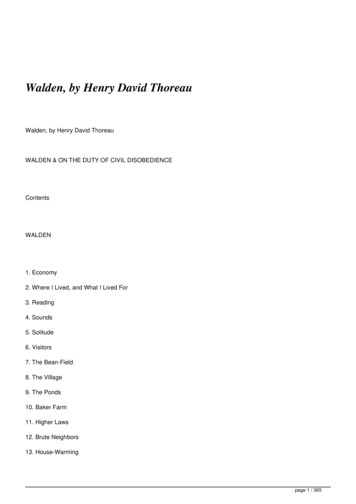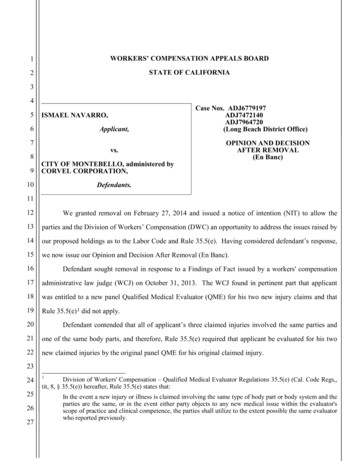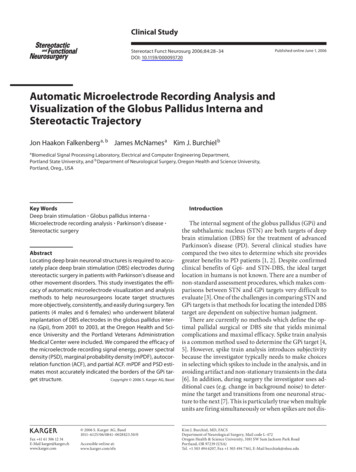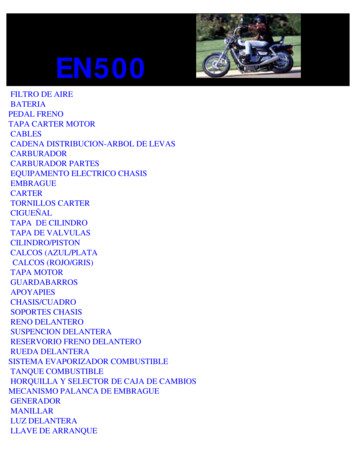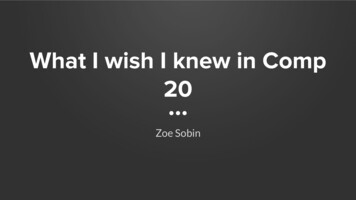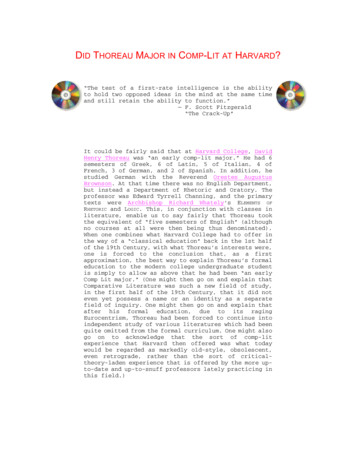
Transcription
DID THOREAU MAJOR IN COMP-LIT AT HARVARD?“The test of a first-rate intelligence is the abilityto hold two opposed ideas in the mind at the same timeand still retain the ability to function.”— F. Scott Fitzgerald“The Crack-Up”It could be fairly said that at Harvard College, DavidHenry Thoreau was “an early comp-lit major.” He had 6semesters of Greek, 6 of Latin, 5 of Italian, 4 ofFrench, 3 of German, and 2 of Spanish. In addition, hestudied German with the Reverend Orestes AugustusBrownson. At that time there was no English Department,but instead a Department of Rhetoric and Oratory. Theprofessor was Edward Tyrrell Channing, and the primarytexts were Archbishop Richard Whately’s ELEMENTS OFRHETORIC and LOGIC. This, in conjunction with classes inliterature, enable us to say fairly that Thoreau tookthe equivalent of “five semesters of English” (althoughno courses at all were then being thus denominated).When one combines what Harvard College had to offer inthe way of a “classical education” back in the 1st halfof the 19th Century, with what Thoreau’s interests were,one is forced to the conclusion that, as a firstapproximation, the best way to explain Thoreau’s formaleducation to the modern college undergraduate studentis simply to allow as above that he had been “an earlyComp Lit major.” (One might then go on and explain thatComparative Literature was such a new field of study,in the first half of the 19th Century, that it did noteven yet possess a name or an identity as a separatefield of inquiry. One might then go on and explain thatafter his formal education, due to its ragingEurocentrism, Thoreau had been forced to continue intoindependent study of various literatures which had beenquite omitted from the formal curriculum. One might alsogo on to acknowledge that the sort of comp-litexperience that Harvard then offered was what todaywould be regarded as markedly old-style, obsolescent,even retrograde, rather than the sort of criticaltheory-laden experience that is offered by the more upto-date and up-to-snuff professors lately practicing inthis field.)
HDTWHAT?INDEXCOMP-LITCOMP-LIT1539Cristóbal de Villalón’s INGENIOSA COMPARACIÓN ENTRE LO ANTIGUO Y LO PRESENTE inaugurated the quarrelbetween the ancients and moderns.COMPARATIVE LITERATURE1802P.J.G. Cabanis opinioned that “It is undoubtedly, citizens, a beautiful and great idea that considers all sciencesand arts to be a part of an ensemble, an indivisible whole.”COMPARATIVE LITERATURE1807Adam Müller opinioned that “The single works of art and single genres were considered to be like limbs andnerves and muscle system of a large body, each one functioning independently in its own fashion and each oneregarded as an obedient part of a beautiful and incomparable whole.”COMPARATIVE LITERATURE1827January 31, Wednesday: In a letter to Johann Peter Eckermann, Johann Wolfgang von Goethe coined the termWeltliteratur to designate an idea that had been being circulated by the likes of Voltaire, Johann GeorgHamann, and especially by Johann Gottfried von Herder in his notion of Weltpoesie. They had previously beenreferring to this supranational unity of all lettered persons worldwide merely as “The Republic of Letters.”More and more the spirit of poetry was going to become the common patrimony (Gemeingut, the publicdomain) of humankind, revealing itself universally rather than particularly.COMPARATIVE LITERATURENational literature is now rather an unmeaning term;the epoch of world literature is at hand.What this has to do with, obviously, is the conceit that the “major” of David Henry Thoreau, a decade later atHarvard College, can most accurately be described by characterizing him as a student in what today would bedenominated as a program in “Comparative Literature.” Here is what my spouse Rey Chow has had to sayabout this in her THE AGE OF THE WORLD TARGET (Durham and London: Duke UP, 2006):The universalist concept of all the literatures of the worldbeing held together as a totality, one that transcends2Copyright 2013 Austin Meredith
HDTWHAT?INDEXCOMP-LITCOMP-LITrestrictive national and linguistic boundaries, remains anenormously appealing one to many people nearly two centuriesafter Goethe proclaimed the notion of Weltliteratur in the1820s. As Edward Said writes, “For many modern scholars –including myself– Goethe’s grandly utopian vision is consideredto be the foundation of what was to become the field nrealizable rationale was this vast synthesis of the world’sliterary production transcending borders and languages but notin any way effacing their individuality and historicalconcreteness.”1 Arising in the historical context of nascentnationalisms in Europe, the notion of world literature partookof the aspirations toward global peace, cosmopolitical right,and intercultural hospitality that were among the most importantintellectual legacies of that period.2 As Susan Bassnett notes:“With the advantages of retrospection, we can see that‘comparative’ was set against ‘national’, and that whilst nsofpartisanship, the study of ‘comparative’ literature carried withit a sense of transcendence of the narrowly nationalistic.” 3 Itwas such transcendence toward a general, cosmopolitan humanitythat Hutcheson Macaulay Posnett, author of the first book-lengthstudy of comparative literature in the English language,proposed as the rationale for the discipline: “the gradualexpansion of social life, from clan to city, from city to nation,from both of these to cosmopolitan humanity, [should be adopted]as the proper order of our studies in comparative literature.”41828In this year and the following one, Abel François Villemain’s series of lectures on comparative literature werebeing published in four volumes as TABLEAU DE LA LITTÉRATURE AU VIIIE SIÈCLE.COMPARATIVE LITERATURE1. Edward W. Said, “Introduction to the Fiftieth-Anniversary Edition,” in Erich Auerbach, MIMESIS: THE REPRESENTATION OFREALITY IN WESTERN LITERATURE, trans. Willard R. Trask, Fiftieth-Anniversary Edition (Princeton: Princeton UP, 1953, 2003),xvi.2. For an example of an influential and controversial philosophical essay on these ideas, see Immanuel Kant, PERPETUAL PEACE,preface by Nicholas Murray Butler (Los Angeles: U.S. Library Association, Inc., 1932). The text of this edition follows the firstedition of Kant’s essay, translated from the German and published in London in 1796.3. Susan Bassnett, COMPARATIVE LITERATURE: AN INTRODUCTION (Oxford: Blackwell Publishers, 1993), 21. Bassnett offers aninformative discussion of the origins of comparative literature as a discipline; see especially pages 12-30.4. Hutcheson Macaulay Posnett, COMPARATIVE LITERATURE (New York: D. Appleton and Company, 1896), 86. Posnett’s work waspublished in “The International Scientific Series,” with a preface bearing the date January 14, 1886.“Stack of the Artist of Kouroo” Project3
HDTWHAT?INDEXCOMP-LITCOMP-LIT1830Abel François Villemain’s TABLEAU DE LA LITTÉRATURE AU MOYEN AGE EN FRANCE, EN ITALIE, EN ESPAGNE ETANGLETERRE extolled the “amateurs de la littérature comparée.”COMPARATIVE LITERATUREEN1831Johann Wolfgang von Goethe noticed that:[I]t is expected that a person who has distinguished himselfin one field . will not . venture into one entirely unrelated.Should an individual attempt this, no gratitude is shown.4Copyright 2013 Austin Meredith
HDTWHAT?INDEXCOMP-LITCOMP-LITAn individual who failed to follow Goethe’s advice, becoming not only a man of literature but also an attorneyat law: Richard Henry Dana, Jr. As a 15-year-old he had been attending a private school in which the teachersfrequently and severely flogged the students: “There was never a half-day without a good deal of flogging.”During this year he matriculated at Harvard College. Quite unlike Henry Thoreau in temperament, he wouldmake poor use of his abundant scholarly free time while enrolled. Evidence of this is that in all of this firstthree-year period of education he would check out from the library only a total of 10 books. Toward the endof this first year he would be rusticated for his part in the Harvard Rebellion, and during this period ofrustication he would be tutored by the conservative professor religion at Andover Theological Seminary, theReverend Leonard Woods (1807-1878).After his dropping out of school in his junior year because his eyesight had been temporarily impaired bymeasles, and after his famous period of recuperation and adventure in California, he would be significantlyolder and more disciplined and yet he would do only slightly better in the study department: he would checkout only 11 more books from the college library. Although Professor Edward Tyrrell Channing had both Dana(who was his cousin) and Thoreau as students, clearly Thoreau learned better about writing from ProfessorChanning than did Dana — all his life this sailor/lawyer/author would preserve a sloppy tendency to leavedanglers in his prose.Another individual who failed to follow Goethe’s advice, becoming not only a medical doctor but also a manof literature: Dr. Oliver Wendell Holmes in this year published a series of essays, in the New EnglandMagazine, entitled “The Autocrat of the Breakfast Table.”(A quarter of a century later, this series would continue, in The Atlantic Monthly.)“Stack of the Artist of Kouroo” Project5
HDTWHAT?INDEXCOMP-LITCOMP-LIT1832Richard Whately, D.D., Archbishop of Dublin took a small place at Redesdale just outside Dublin, where hecould garden. He prepared a statement of his views on the Sabbath, THOUGHTS ON THE SABBATH. Hepublished his course of INTRODUCTORY LECTURES as Professor of Political Economy at Oxford University andendowed a Whately Chair in Political Economy at Trinity College, Dublin. As an opponent of Ricardiantheory, he set out the rudiments of a subjective theory of value in INTRODUCTORY LECTURES ON POLITICALECONOMY (to problematize the labor theory of value he argued that “It is not that pearls fetch a high pricebecause men have dived for them; but on the contrary, men dive for them because they fetch a high price”; hedeclared that economics ought to be known as catallactics, the “science of exchanges”). Revision and separatepublication of what previously had been an article in the ENCYCLOPÆDIA METROPOLITANA as a textbooksuitable to be used during Henry Thoreau’s college education: ELEMENTS OF LOGIC. (Cambridge: JamesMunroe, and Company / Booksellers to the University; New-York: Published by William Jackson, No. 71Maiden Lane).COMPARATIVE LITERATUREWHATELY’S LOGICIt could be fairly said that at Harvard College, DavidHenry Thoreau was “an early comp-lit major.” He had 6semesters of Greek, 6 of Latin, 5 of Italian, 4 ofFrench, 3 of German, and 2 of Spanish. In addition, hestudied German with the Reverend Orestes AugustusBrownson. At that time there was no English Department,but instead a Department of Rhetoric and Oratory. Theprofessor was Edward Tyrrell Channing, and the primarytexts were Archbishop Richard Whately’s ELEMENTS OFRHETORIC and LOGIC. This, in conjunction with classes inliterature, enable us to say fairly that Thoreau tookthe equivalent of “five semesters of English” (althoughno courses at all were then being thus denominated).When one combines what Harvard College had to offer inthe way of a “classical education” back in the 1st halfof the 19th Century, with what Thoreau’s interests were,one is forced to the conclusion that, as a firstapproximation, the best way to explain Thoreau’s formaleducation to the modern college undergraduate studentis simply to allow as above that he had been “an earlyComp Lit major.” (One might then go on and explain thatComparative Literature was such a new field of study,in the first half of the 19th Century, that it did noteven yet possess a name or an identity as a separatefield of inquiry. One might then go on and explain thatafter his formal education, due to its ragingEurocentrism, Thoreau had been forced to continue intoindependent study of various literatures which had beenquite omitted from the formal curriculum. One might alsogo on to acknowledge that the sort of comp-litexperience that Harvard then offered was what todaywould be regarded as markedly old-style, obsolescent,6Copyright 2013 Austin Meredith
HDTWHAT?INDEXCOMP-LITCOMP-LITeven retrograde, rather than the sort of criticaltheory-laden experience that is offered by the more upto-date and up-to-snuff professors lately practicing inthis field.)“Stack of the Artist of Kouroo” Project7
HDTWHAT?INDEXCOMP-LITCOMP-LIT1833August 9, Friday: Waldo Emerson left London on a visit to Oxford.David Henry Thoreau, accepted as a charity scholar, left home for Harvard College.5 While an undergraduateat Harvard 1833-1837 in what essentially was its “Comp Lit” program, he would reside initially with CharlesStearns Wheeler of Lincoln in an upstairs room, 20 Hollis Hall, that had (has) a fine view of the sunsets acrossthe Common.6COMPARATIVE LITERATURE5. Since the native-son undergraduates Lemuel Shattuck mentions in Chapter XVI of his history of Concord were in the HarvardCollege classes of 1834 (George Moore) and 1835 (Hiram Dennis and Ebenezer Hoar), this material would have needed to havebeen written between May 1833 and May 1834. The earlier date is more likely than the later date since Marshall Meriam, whograduated from Yale College with its Class of 1833, is carried as still an undergraduate there. David Henry Thoreau of Concord wasunmentioned as a current Harvard College undergraduate in that 1835 history, therefore, simply because at the time the material wasbeing penned, he had not yet matriculated.6. He later occupied other rooms nearby in the same dormitory.8Copyright 2013 Austin Meredith
HDTWHAT?INDEXCOMP-LITCOMP-LIT“Stack of the Artist of Kouroo” Project9
HDTWHAT?INDEXCOMP-LITCOMP-LITHolden ChapelHollis HallNFellows’BarnHarvard HallStoughton HallMassachusetts Hall10Copyright 2013 Austin Meredith
HDTWHAT?INDEXCOMP-LITCOMP-LITHe had “many and noisy neighbours, and a residence in the fourth storey.” At that time tuition was 55.00 peryear, Harvard had a faculty of perhaps 25 and a student body of perhaps 425, and the library boasted perhaps40,000 books. Meals at the commons were 1.35 a week. From the 1820s into the 1840s, the regulationstudent attire was a “black-mixed” suit consisting of pantaloons, waistcoat, coat, tie, hat, shoes, and buttons ofprescribed color, and various versions of this regulation attire were available at stores near campus for between 15.00 and 25.00. Thus although the top hat and the cane did not become de rigeur for the Harvard Man untilthe 1840s, to outfit Freshman Thoreau properly for his college career in 1833 would have required 30% to 50%of his scholarship money, and was just out of the question. In addition, President Josiah Quincy, Sr. informedThoreau that his performance on the entrance examination had been such thatOne branch more, and you had been turned by entirely.You have barely got in.We need not ask why, in the 19th Century, David Henry was favored by his family over Helen and over Sophiafor this expensive education, but one of the unresolved questions in my mind is how it came about that, in afamily in which first son and namesake John clearly was regarded as the more capable manchild, and in whichthere had been talk of apprenticing little brother to a carpenter, it came about that it was young David Henry“Stack of the Artist of Kouroo” Project11
HDTWHAT?INDEXCOMP-LITCOMP-LITwho went off to college to be partly supported by the earnings of his siblings.THOREAU RESIDENCESDuring this initial year at Harvard, David Henry would be subjected to a “thorough course” of “PlaneTrigonometry, Analytic Geometry, and Algebra with practical application to Heights and Distances, andSurveying and Navigation.” It would appear clear from the presence of a copy of Ebenezer Bailey’s FIRSTLESSONS IN ALGEBRA; BEING AN EASY INTRODUCTION TO THAT SCIENCE. DESIGNED FOR THE USE OFACADEMIES AND COMMON SCHOOLS. BY EBENEZER BAILEY, PRINCIPAL OF THE YOUNG LADIES’ HIGHSCHOOL, BOSTON; AUTHOR OF “YOUNG LADIES’ CLASS BOOK,” ETC. in Thoreau’s personal library, and fromthe fact that this text was published by Carter, Hendee & Co. during July of this year in Boston, that the book12Copyright 2013 Austin Meredith
HDTWHAT?INDEXCOMP-LITCOMP-LITmust have been useful for this course.1ST LESSONS IN ALGEBRAThis course on navigation is still being offered and happens now to be the longest continuously runningsubject-matter offered there! “It’s the most practical course you can take at Harvard,” commented Dan Justicz’91, an alum. “You find your way by watching the movements of the sun and stars. You even construct yourown navigation instruments. There’s a minimum of lecturing.” “We use the historical instrument collection at[Harvard] Science Center, maps dating back to the 13th century at Pusey Library, and ships’ logbooks as oldas 200 years,” says the instructor, Dr. Sadler. “Students come to appreciate how difficult it was for Columbus,or Magellan, to find their way without accurate clocks.” The course is now offered as endowed under theFrancis W. Wright Lectureship in Celestial Navigation.(Thoreau’s Harvard curriculum would include eight terms of Greek under Professor Cornelius Conway Feltonand [Instructor?] Dunkin. These eight terms would begin with Greek composition and grammar, and continueinto “Greek Antiquities” and works by Xenophon, Demosthenes, Aeschines, Sophocles, Euripides, andHomer. –What, your college education was not like that?— Perhaps you didn’t major in Comp Lit! :-)“Stack of the Artist of Kouroo” Project13
HDTWHAT?INDEXCOMP-LIT14COMP-LITCopyright 2013 Austin Meredith
HDTWHAT?INDEXCOMP-LITCOMP-LITNEW “HARVARD MEN”September 1, Sunday: An excerpt from a letter from Caroline Downes Brooks to her remote stepmother MaryMerrick Brooks:PS. My Dear Mother, I have always noticed when any thing happenswith me and George or the girls, that you think that I do notcare any thing about you, because I have been told that you arenot my own mother, but it is very different. I have never knownany other mother, therefore I know no difference. There has beenvery little told me about her, therefore why should I have sucha detestation of you, because you are not my mother, when I knewno other. I certainly do not think my Dear Mother that I spiteyou, as you say, think of it how horrid. I am sure that yourdaughter shall not be guilty of such injustice. Forgive me pastinjuries and be assured you shall ever after have a [sic]affectionate and dutiful daughter, in your own Caroline.At Harvard College, David Henry Thoreau enrolled for freshman classes in Greek, Latin, Mathematics,and History.1834NEW “HARVARD MEN”Revision and separate publication of an article in the ENCYCLOPÆDIA METROPOLITANA as a textbook suitableto be used during Henry Thoreau’s college education: Archbishop Richard Whately, D.D.’s ELEMENTS OFRHETORIC. (Cambridge: James Munroe and Company / Booksellers to the University; New York: WilliamJackson).COMPARATIVE LITERATUREWHATELY’S RHETORICIt could be fairly said that at Harvard College, DavidHenry Thoreau was “an early comp-lit major.” He had 6semesters of Greek, 6 of Latin, 5 of Italian, 4 ofFrench, 3 of German, and 2 of Spanish. In addition, hestudied German with the Reverend Orestes AugustusBrownson. At that time there was no English Department,but instead a Department of Rhetoric and Oratory. Theprofessor was Edward Tyrrell Channing, and the primarytexts were Archbishop Richard Whately’s ELEMENTS OFRHETORIC and LOGIC. This, in conjunction with classes inliterature, enable us to say fairly that Thoreau took“Stack of the Artist of Kouroo” Project15
HDTWHAT?INDEXCOMP-LITCOMP-LITthe equivalent of “five semesters of English” (althoughno courses at all were then being thus denominated).When one combines what Harvard College had to offer inthe way of a “classical education” back in the 1st halfof the 19th Century, with what Thoreau’s interests were,one is forced to the conclusion that, as a firstapproximation, the best way to explain Thoreau’s formaleducation to the modern college undergraduate studentis simply to allow as above that he had been “an earlyComp Lit major.” (One might then go on and explain thatComparative Literature was such a new field of study,in the first half of the 19th Century, that it did noteven yet possess a name or an identity as a separatefield of inquiry. One might then go on and explain thatafter his formal education, due to its ragingEurocentrism, Thoreau had been forced to continue intoindependent study of various literatures which had beenquite omitted from the formal curriculum. One might alsogo on to acknowledge that the sort of comp-litexperience that Harvard then offered was what todaywould be regarded as markedly old-style, obsolescent,even retrograde, rather than the sort of criticaltheory-laden experience that is offered by the more upto-date and up-to-snuff professors lately practicing inthis field.)16Copyright 2013 Austin Meredith
HDTWHAT?INDEXCOMP-LITCOMP-LITAt Harvard College, Cornelius Conway Felton became Eliot Professor of Greek Literature and had DavidHenry Thoreau as one of his pupils. Professor Felton was positioning an essay in the North American Reviewin defense the teaching and study of classical mythology, especially Greek mythology, which evidently wasconsidered in need of a defense as it seemed to be encouraging lewdness. For Professor Felton, expurgation ofthe classic texts to delete titillating stuff did not represent a problem of suppression and censorship, but ratherrepresented the correction of a problem of debasement and inauthenticity, because it was inconceivable thatthere could have been any actual “food for the passions” in originary authentic works of classicism, or, at least,in works of Greek classicism.To the scholar we would say, then, expurgate yourHoraces and your Ovids, till not an obscene thoughtshall stain their pages; and you may be sure thatnothing will be lost in your enquiries respecting theclassic religion.No, for if you credit Professor Felton’s reconstruction of European history, these dead white men could neverhave been guilty of worshiping at “altars of indecency and wantonness.”“Stack of the Artist of Kouroo” Project17
HDTWHAT?INDEXCOMP-LITCOMP-LITHanging being a piece of public theater, however, it was sometimes required of a condemned man in thismodern decent society that he attire himself in his shroud (a long white linen or cotton garment with open backand long sleeves) prior to the placement of the hood and the noose. Local taverns would sometimes hire“watchers” to keep around-the-clock guard upon a condemned man, not to prevent his escape of course but toensure that he would not cheat them of their profits from the alcohol-imbibing throng of men come to witnessa hanging. No way would such an important participant in an expected ceremony be allowed to off himself inprivate in advance. When a condemned man was reprieved at the last moment, as indeed sometimes happened,this might incite the disappointed throng to riot, for although we have few records for such items as the shroudand the death watch, we know that this sort of riot is actually what did result from a reprieve in Pembroke MAin this year.7The lenience of Harvard President Reverend John T. Kirkland had been succeeded by the strictness ofPresident Josiah Quincy, Sr., the former mayor who was attempting to deal with student rebellion as he hadonce dealt with mobs attempting to tear down Boston’s whorehouses: by repression. Students at Harvard wererioting over living conditions and the entire Sophomore class was being not merely expelled but hauled beforea court.7. In this year Pennsylvania became the first state to move executions away from the public eye and carry them out only withinprison enclosures.18Copyright 2013 Austin Meredith
HDTWHAT?INDEXCOMP-LITCOMP-LITRecords of faculty meetings from this period show that in the shifting minority of professors who opposed andattempted to moderate Quincy’s crackdowns, Professor Charles Follen was alone in constancy of opposition.8Freshman David Henry Thoreau evidently made himself scarce during the tearing of shutters off windows andthe building of bonfires in front of doorways and his only contribution to the rebellion was a comment heappears to have made in Dr. Beck’s examination room –apparently sarcastically– “Our offense was rank.”9One midnight during the great Harvard Rebellion Ebenezer Rockwood Hoar lay on his back in the belfry ofHarvard Hall and sawed off the tongue of the bell that summoned the students to morning chapel. Fortunatelyhe was not caught destroying property, or perhaps later he would not have been able to become AttorneyGeneral of the United States of America:Of his college life little remains to say. In hisJunior and Senior years he attracted the attention ofEdward Tyrrell Channing, then the valued Professor ofRhetoric and Oratory, and received the highest marksfor English Composition. He also won the second Bowdoinprize for an essay, and at the Exhibition in his Senioryear had, as his part, the English oration, taking ashis subject “Reverence.” His part at Commencement whenhe graduated was an English oration on “The ChristianPhilosophy; its Political Application.” Only fifty-twoof his class received degrees at Commencement [80 hadentered this class of 1835, and Richard Henry Dana, Jr.had been forced to drop out on account of his eyes],largely a result of the “Rebellion,” but five more wereallowed their Bachelor’s degree years later. RockwoodHoar was third scholar. The refined and attractiveHarrison Gray Otis Blake of Worcester, later Thoreau’snear friend, was chosen Orator by a large majority, buthis modesty made him decline, and Charles C. Shackford,later a minister, and a professor at CornellUniversity, was then chosen. Blake, however, gave theLatin Salutatory. Benjamin Davis Winslow was the Poet.Hoar was chosen a member of the Class Committee.It need only be added to this, that the student who was first scholar in the Harvard College class of 1835, aclass that included Ebenezer Rockwood Hoar, and who was chosen to replace H.G.O. Blake, who was thatclass’s fourth scholar, as the class Orator, Charles Chauncy Shackford, after graduation went out to Concordand became a schoolteacher and romanced the local lasses, before going on to study law, and becoming aminister in 1841, and eventually becoming a professor at Cornell University. At Cornell, he would be theirprofessor of rhetoric and literature, and, incidentally, would make himself one of the pioneers in the field nowknown as Comparative Literature.COMPARATIVE LITERATURE8. Professor Karl Follen’s brother Paul Follen was at this point emigrating to the United States, and would settle in Missouri.We’ll allow you three guesses as to what is about to happen to Professor Follen himself.9. At Harvard at this time, the offense of “grouping” in Harvard Yard, that is, students assembling for some purpose not condonedby the faculty (such as, for instance, free speech), was grounds for being asked to “take up one’s connexions,” that is, grounds forpermanent expulsion from college. (Such rules are of course not limited to the Harvard of the 19th Century: my own memories areof smelling tear gas on the steps of Widener Library as I came away from my carrel and found out that there had been a “Pogo Riot”in which the police had rioted and cleared the intersection in front of the student bookstore of passersby in 1960-1961, and then ofbeing vomit gassed by US Marine guards on the street outside our embassy in Tehran, Iran in 1978 for the offense of attempting toobtain entry thereto as a US citizen in an Iran in which soldiers were authorized to kill anyone “assembling” in any public place ina group larger than two persons.)“Stack of the Artist of Kouroo” Project19
HDTWHAT?INDEXCOMP-LITCOMP-LITMay 19, Monday: Infelice op.94 for soprano and orchestra by Felix Mendelssohn was performed for theinitial time, in London.Marie, daughter of Medora Leigh and her brother-in-law, Henry Trevanion, was born.That morning at Harvard College an unfortunate tendency had begun to develop: A freshman had been recitingin Mr. Christopher Dunkin’s class in Greek, and, as his performance was being critiqued, appeared to thatTutor to be displaying some sort of attitude of questioning, of the judgment of his betters. Unfortunately, also,as Tutor displayed a bad reaction, other of the students began to make “catcalls,” appearing to be in support ofthis student.July 3, Thursday: David Henry Thoreau was elected to the oldest debating fraternity at Harvard College,which was during that period known as “The Institute of 1770” after having gone through several namechanges.In consequence of all the immediate members of the Society beingabsent, a special meeting was called by Cushing, the last JuniorPresident, for the purpose of choosing a Librarian, and Fresh[men]into the Society. The meeting being called to order — Cushing waschosen President and Brooks Sec. pro tem — The Society thenproceeded to the choice of a Librarian, and chose Lyon. Thenomination list of Freshmen left by the Sophomores was next takenup, and Hildreth, Richardson, Eustis, Thomas, Perry, Trull,Thoreau, were chosen from this list. Russell, Rice, Barnes, Wight,Phelps, Davis, Treat, Lane, Williams 1st and Wheeler were nominatedto be chosen at the next meeting.This is the club which, after several more name changes, would become immortal as our “Hasty PuddingClub.” We note in passing that of the Emerson brothers, Judge William Emerson, Edward Bliss Emerson, andCharles Chauncy Emerson had been members, but –for some unknown reason– not Waldo Emerson.WALDO’SRELATIVESSeptembe
the epoch of world literature is at hand. What this has to do with, obviously, is the conceit that the "major" of David Henry Thoreau , a decade later at Harvard College , can most accurately be described by characteriz ing him as a student in what today would be denominated as a program in "Comparative Literature."
